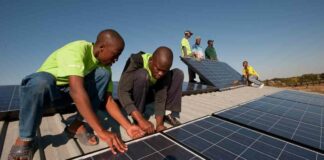From Africa to Southeast Asia, the Trump administration is cancelling US support for projects designed to replace coal, oil, and gas with clean energy, pushing instead for the use of American taxpayers’ money to support planet-heating fossil fuels. Since January, Donald Trump has scrapped energy transition partnerships with South Africa, Indonesia, and Vietnam, and is attempting to halt US backing for the African Development Bank (AfDB) and multilateral Climate Investment Funds. Climate campaigners are concerned that these changes will lead to increased dependence on coal, oil, and gas in developing countries, exacerbating climate change and hindering economic development.
US Withdraws Support for Energy Transition Partnerships
The US, along with other wealthy countries, had joined forces with coal-reliant emerging economies like South Africa, Indonesia, and Vietnam on Just Energy Transition Partnership (JETP) plans to transition from coal to clean energy in a fair manner for workers and communities. However, the Trump administration has decided to pull out of these agreements, leading to the withdrawal of financial support. This move has raised concerns among other nations involved in the partnerships, who have expressed their disappointment with the US’s decision.
Impact on South Africa’s Energy Transition Efforts
South Africa, a country heavily reliant on coal, has been working on transitioning to cleaner energy sources with the help of international partnerships and funding. However, the US’s withdrawal of support has dealt a significant blow to these efforts, jeopardizing projects aimed at repurposing coal-fired power plants and implementing renewable energy solutions. The delay in securing funding for these initiatives could prolong the decarbonization process and hinder the country’s progress towards a more sustainable energy sector.
US Budget Cuts and Shift towards Fossil Fuel Support
In its proposed budget for 2026, the Trump administration has outlined cuts to funding allocated for climate-related initiatives, including the CIF and the Global Environment Facility. These budget cuts could have far-reaching implications for global efforts to combat climate change and support clean energy transitions. Additionally, the administration has signaled its willingness to increase public funding for fossil fuel projects overseas, diverging from the international trend of phasing out support for coal-fired power plants.
Challenges Ahead for Clean Energy Advocates
As the US administration continues to prioritize fossil fuel projects over clean energy initiatives, advocates for sustainable development and climate action face an uphill battle. The reversal of policies supporting energy transition partnerships and the push for increased funding for coal projects abroad highlight the challenges of advancing clean energy agendas in a political landscape that favors traditional energy sources. Despite these setbacks, proponents of renewable energy and environmental sustainability remain committed to advocating for a transition towards cleaner, more sustainable energy systems.
In conclusion, the Trump administration’s decision to withdraw support for clean energy projects and prioritize fossil fuel investments has raised concerns among environmental advocates and stakeholders. The implications of these policy shifts extend beyond individual projects to impact global efforts to mitigate climate change and promote sustainable development. As countries grapple with the urgent need to transition to cleaner energy sources, the US’s stance on fossil fuel funding abroad presents a significant obstacle to achieving climate goals and building a more sustainable future.














